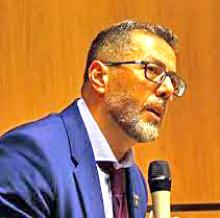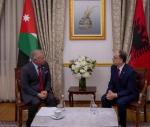You are here
Abbas vs. Dahlan — the showdown begins
Mar 25,2014 - Last updated at Mar 25,2014
When Palestinian leader Yasser Arafat was confined by Israeli soldiers to his headquarters in the West Bank city of Ramallah, Mohammed Dahlan reigned supreme. As perhaps the most powerful and effective member of the “Gang of Five”, Dahlan managed the affairs of the ruling Fateh movement, coordinated with Israel regarding matters of security, and even wheeled and dealt in issues of regional and international affairs.
That was the period between March and April 2002, and it was a different time.
Back then, Dahlan — a former Palestinian Authority (PA) minister, a former national security adviser and a former head of Gaza’s PA Preventative Security Service (PSS) — was king of the hill.
All his rivals were conveniently, or by chance, out of the picture. Arafat was then imprisoned in his office in the Muqata, and Dahlan’s toughest contender, Jibril Rajoub, leader of the West Bank PSS, was discredited in a most humiliating fashion.
During the most violent Israeli crackdown on the second Palestinian Intifada (2000-2005), Rajoub handed the PSS headquarters to the Israeli army with all its Palestinian political prisoners and walked away. Since then, Rajoub’s star faded into a dark chapter of Palestinian history. For Dahlan, however, it was yet a new start.
This is not exactly the kind of history the Fateh leadership, Dahlan included, would like to remember. Such history is simply too dangerous as it underscores the reality that engulfed and to a large degree continues to shape the ruling class of the Palestinian Authority in Ramallah, whose reach touches upon every aspect of Palestinian life.
The second uprising, starting in September 2000, unlike the first Intifada of 1987, resulted in much harm. The latter revolution seemed to lack unity of purpose, was more militarised, and allowed Israel to rearrange the post-Intifada and post-Arafat political scene in such a way as to privilege its trusted allies within the Palestinian camp.
Dahlan, and current PA President Mahmoud Abbas, elected in 2005 to a five-year term, were obviously spared the Israeli purges. Hamas, on the other hand, lost several layers of its leadership, as did the Islamic Jihad and the Popular Front for the Liberation of Palestine which, like other socialist groups, suffered massive crackdowns and assassinations. Even Fateh activists paid a terribly heavy price in blood and imprisonments because of the leading role they played in the Intifada.
For Abbas and Dahlan, however, things were not too bad. In fact, at least for a while, the outcome of the Intifada was quite beneficial for some Palestinian leaders who had been, at one point, relegated to minor roles. Thanks to Israeli schemes, and American pressure, they were brought back into the limelight.
Twelve years later, both Abbas and Dahlan are still the centre of attention. Abbas, 79, is an ageing president of an authority that has access to funds but no real sovereignty or political leverage (aside from what Israel finds acceptable); Dahlan, 52, is in exile in the UAE after his supporters were chased out of Gaza by Hamas in 2007, and then the West Bank by his own party in June 2011. This occurred after he was accused of corruption and of poisoning Arafat, on behalf of Israel, during the Israeli siege.
But Dahlan, aided by some strong friends around the region — and of course, his old intelligence contacts in Israel and the US — is unmistakably plotting a comeback.
Abbas knows well that his rule is approaching a sensitive point of transition, and not only because of his old age.
If US Secretary of State John Kerry’s peace mediation deadline of April 29 results in nothing substantial, as will most likely be the case, it would not be easy for Abbas to keep Fateh’s various competing cliques under control.
And since Dahlan is sagaciously finding and manipulating gaps to reassert his relevance in a political milieu that continues to reject him, Abbas is lashing out in anticipation of a possible showdown.
Interestingly enough, Dahlan is answering in kind, by using the generous space given to him by private Egyptian media.
Fateh is in crisis once more and, due to its political dominance, Palestinian political institutions in their entirety are likely to suffer.
Even after being banished by both Hamas and Fateh, Dahlan’s name continued to be associated with bloody conflicts in the Middle East.
In April 2011, Libya’s Transitional National Council accused him of links to an Israeli weapons cache that was allegedly received by former Libyan leader Muammar Qadhafi.
Mohammad Rashid was another name mentioned by the Libyans, as he was also a member of the “Gang of Five” and Fateh Central Committee.
But things got even uglier when a Hamas leader, Mahmoud Al Mabhouh, was assassinated in Dubai in January 2011. While Hamas maintains that Mossad was behind the assassination (as shown on video footage), two of the suspects who were arrested in Dubai for their purported involvement and for providing logistical aid to the Mossad hit team — Ahmad Hassanain and Anwar Shheibar — work for a Dahlan-owned construction company in Dubai.
The men’s intriguing resumes also link them to a death cell under Dahlan’s command that operated in Gaza and was dedicated to suppressing any dissent among Palestinian groups.
The ongoing Abbas-Dahlan spat is inadvertently confirming all Fateh detractors’ suspicions regarding the leadership role in conspiring with Israel to destroy the resistance and its leaders.
Yet, strangely, both Abbas and Dahlan continue to present themselves as the saviours of the Palestinians, while each accuses the other of being an Israeli collaborator and an American stooge.
Palestinians are not amused. It went as far as making Mousa Abu Marzouk, a senior Hamas member, call on Abbas and Dahlan “to refrain from exchanging accusations that serve only the Israeli interests”, as reported by the Middle East Monitor on March 20.
Abbas’ list of accusations against Dahlan (first delivered to the Fateh Revolutionary Council on March 10, then publicly two days later), included Dahlan’s role in the assassination of a top Hamas and resistance leader, Salah Shahadeh, along with his family and some of his neighbours in an Israeli air strike in 2002.
Abbas went further by suggesting a Dahlan role in the poisoning of Arafat in 2004. The PA president made a reference to “three spies” who worked for Israel and carried out high-profile assassinations. Aside from Dahlan, the “spies” included Hassan Asfour, who is another member of the “Gang of Five”.
On March 16, in an “interview” with privately owned Egyptian Dream 2 satellite channel, which lasted hours, Dahlan was granted uncontested space to articulate his political agenda as he saw fit.
He called Abbas a “catastrophe” for the Palestinians: “The Palestinian people can no longer bear a catastrophe like Mahmoud Abbas. Since the day he came to power, tragedies have struck the Palestinian people. I may be one of the people who bear the blame for bringing this catastrophe upon the Palestinian people.”
The saga continues with all of its unpleasant details. Fateh supporters who are loyal neither to Abbas nor to Dahlan know well that their movement must fight for and reclaim its revolutionary identity, the very reason behind its existence in the first place.
The writer is an internationally syndicated columnist, a media consultant, an author and the editor of PalestineChronicle.com. His latest book is “My Father Was a Freedom Fighter: Gaza’s Untold Story” (Pluto Press, London). He contributed this article to The Jordan Times.













